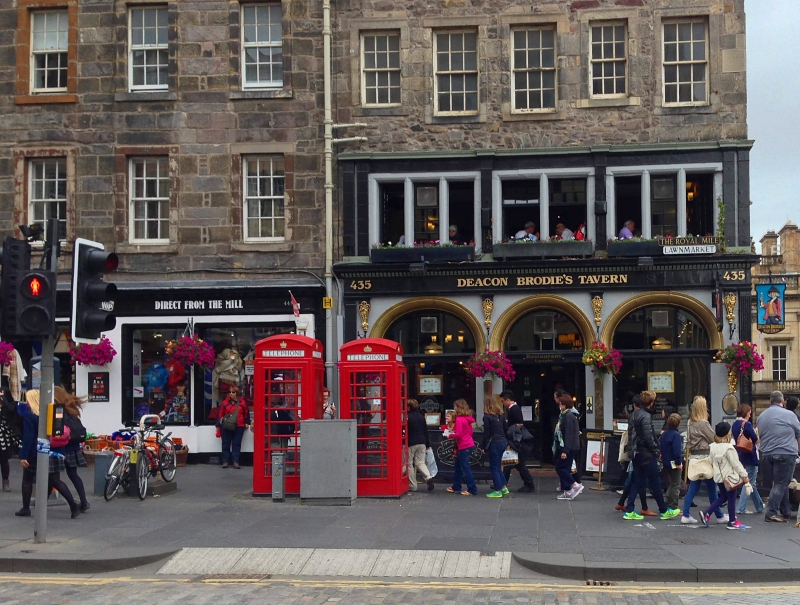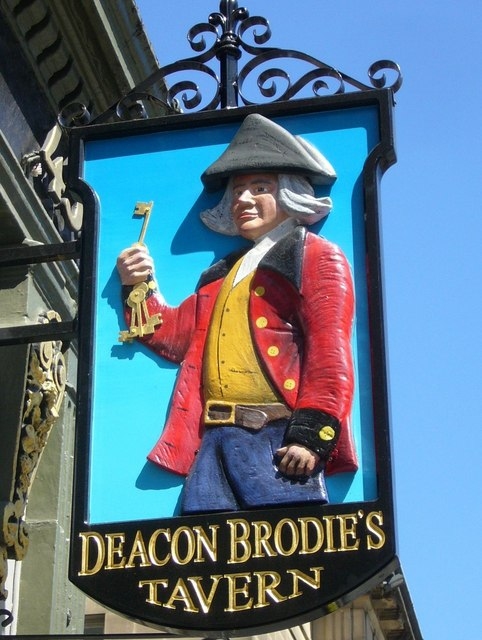
It's close to 7:00PM by the time we arrive at Deacon Brodies. Named after William Brodie, a Deacon of the Guild of Wrights (cabinet makers), the tavern was built in 1703. Brodie was member of the Town Council, leading a respectable life as a pious, wealthy citizen during the day. By night though, his social life included gambling, dice playing and drinking in the taverns.
From 1786 he began to commit robberies to pay for his gambling debts. When working in clients' homes he would gain knowledge of the layout and make impressions of the keys. By night he would return. One of his assistants, in an attempt to avoid transportation for his own previous crimes, gave evidence against Brodie. Brodie was subsequently hung, on October 1, 1788, on gallows he had designed and built himself. Brodie was the inspiration for Robert Louis Stevenson's Jekyll and Hyde tale.
A piper stands on the corner by the entrance to the tavern, and I hesitate a moment, knowing this is the last time I will hear the pipes other than on recordings for quite some time. I close my eyes and the crowds disappear. For a moment I am alone, with the music tugging at my heartstrings.
The pub at street level is very busy and clamoring with happy voices and music. Up the stairs we go to the restaurant where, despite the numbers below, we are seated right away. I'm not very hungry, having devoured my roast beef baguette at Greyfriars Bobby's and decide to have a starter for my main course and pudding. This is the first and only place I've seen iced tea on the menu and it goes down well with my Prawn Cocktail with Rose Marie Sauce, which tastes similar to thousand island dressing.
I've mentioned to the waitress that the starter will be my main course, and she has obviously taken this to heart. There are so many shrimp that I can't finish it. Still, I can't leave without pudding and order Caramel Apple Granny, which is a soft cheese pie topped with apple crisp, drenched in caramel sauce with a froth of fresh double cream.
Dana has ordered Sticky Toffee Pudding and Robin has become adventurous, ordering something called Claranach, which is layers of fresh berries and whipped cream, with a tot of whisky poured over top. As usual, we all have a taste of each others' desserts and leave little in our dishes.
Downstairs we speak with the bartender about purchasing tee-shirts. There are three of us and only one of him and after asking sizes and colors that we want he disappears into a back room. He knows his business (and apparently women) well, as he returns with an armload of dozens of tee-shirts for us to choose from. The bus has stopped running by the time we leave Deacon Brodies, but that's okay. The walk to Castle Terrace is (thankfully) downhill most of the way.

Part of Brodie's work as a cabinetmaker was to install and repair locks. As the foremost locksmith of the city, Brodie was asked to work in the houses of many of the richest members of Edinburgh society. By day, he socialized with the gentry of Edinburgh; at night, he became a housebreaker and thief. He used his daytime work as a way to gain knowledge about the security mechanisms of his customers and to copy their keys using wax impressions. He reputedly began his criminal career around 1768, when he copied keys to a bank door and stole £800, then enough to maintain a household for several years. In 1786 he recruited a gang of three thieves, including George Smith, a locksmith who ran a grocer's shop.
The case that led to Brodie's downfall began in 1788 when he organized an armed raid on an excise office in Chessel's Court on the Canongate. Brodie's plan failed. Realizing that he had to leave Edinburgh, Brodie escaped to London and then to the Netherlands intending to flee to the United States, but was arrested in Amsterdam and shipped back to Edinburgh for trial.
Brodie was hanged at the Old Tolbooth in the High Street on 1 October 1788, before a crowd of 40,000.
Read more about Deacon Brodie at Wikipedia.